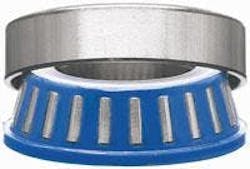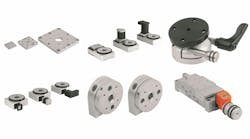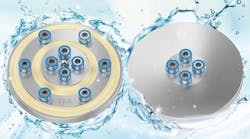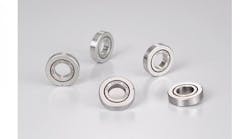Solid Oil bearing technology provides an ideal lubrication solution for bearings to withstand cold operating temperature extremes and rapid temperature changes typically encountered in a wide range of food processing applications. The technology can be applied to virtually every bearing type (including stainless steel) with sufficient internal free space. Ultimately, this eliminates any need for relubrication, minimizes ingress of potentially damaging contaminants, and resists most chemicals without emulsifying during harsh washdowns.
Solid Oil consists of a polymer matrix saturated with lubricating oil that fills the internal space in a bearing and encapsulates the bearing’s cage and rolling elements. This minimizes the “breathing” phenomenon in a bearing (when air expands and contracts internally due to rapid temperature changes) and protects against the entry of water or moisture during hygienic cleanings that can cause corrosion or grease emulsification in conventionally lubricated bearings.
Since the polymer matrix contains two to four times more lubricating oil than standard grease-filled bearings, relubrication becomes unnecessary. Food-safe Solid Oil bearings are engineered to perform reliably in extreme temperature applications from -5 to -49°F (-15 to -45°C), withstand high centrifugal forces, and will not leak or otherwise contaminate the environment during production.
Among available lubricants, NSF H1 approved or compliant selections are available down to -49°F (-45°C).
- Oil saturated, polymer material molded into the bearing, forming very narrow gaps between the rolling elements, raceways, and cage(s), enabling the bearing to rotate freely
- Has a porous structure with millions of micro-pores that retain the lubricating oil by surface tension
- Virtually fills all of the free space in the bearing
- Releases oil into the narrow gaps during operation, providing effective minimum quantity lubrication





